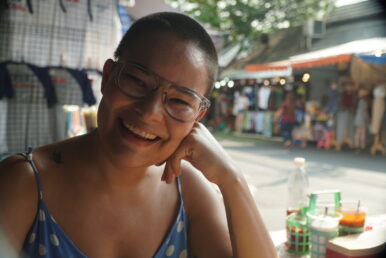Inspiring grads: Christine ‘CC’ Hier
UIC sociologist Amy Bailey describes Christine “CC” Hier as “intellectually fearless, deeply committed to using her scholarship for social justice and exceptionally focused on her academic pursuits.”
Through her Honors College capstone project at UIC, Hier has deepened her dedication to social justice and pursuit of a career involving research that informs public policy on racial inequality.
In a class led by Bailey, associate professor of sociology and Hier’s Honors College Fellow, Hier coded archival documents related to lynchings that occurred in the southern United States. It served as the inspiration for her capstone project, which examines multigenerational trauma that connects the history of lynching in the U.S. with ongoing murders by police.
Diligently working on such an intense and personal subject for the past 18 months has been fulfilling and moving — but most importantly necessary, according to Hier.
“It’s very prudent for where we are as a society today. In my research, I don’t just look at historical lynchings that we are ‘familiar’ with in terms of their historical context, but I bring that into the modern day and define modern-day lynchings under police murders and focus on the lack of due process,” she said. “I love that this project solidifies what I love to do, and I know that this is what I want to do for the rest of my life.”
After she graduates with a bachelor’s degree in sociology Dec. 10 from the College of Liberal Arts and Sciences, Hier wants to continue inequality research and is currently exploring international graduate school opportunities at Sciences Po in Paris, Oxford and Cambridge. She hopes to eventually hold a management role with a nonprofit, such as Black Lives Matter, that allows her to work on research to help inform public policies.
“Lynching was just signed into law as a federal hate crime this year so I think that says a lot about how far we still have to go with protecting Black and brown lives. This is absolutely what I want to do and what I’m extremely passionate about,” she said.
Hier looks back at her time at UIC as a “wonderful experience,” particularly developing important connections and interpersonal relationships with students and professors alike.
“I love being super-involved with professors in my classes, and with other students in collaborative work,” she said. “My last couple years have just been wonderful being able to be on campus, interact and knock on doors and just say, ‘Hey, do you have a minute?’”
”Her genuine excitement about learning and ideas, even communicated over Zoom during the depths of the pandemic, was infectious,” Bailey said.
She is a member of the French and Sociology clubs at UIC and was the only sociologist in the first cohort of UIC’s Social insurance Undergraduate Research Fellowship, a competitive program that provides promising undergraduate students with an introduction to the policies surrounding the social safety net and opportunities for research investigating these programs, and their impact on economically vulnerable populations.
During and after high school, the native of Chicago’s Logan Square neighborhood dealt with family and mental health matters that delayed her college career. She worked for 10 years in high-end retail businesses and restaurants.
“I just realized that my questioning spirit wasn’t a good fit for most jobs,” she said. “My struggle with depression and anxiety is ongoing, but since finding purpose and reason within academia, I can finally see the light at the end of the tunnel.”
Hier eventually applied that inquisitive nature during two years of study at Harold Washington College, which served as her springboard to UIC. There she was drawn to research and a potential career in sociology through the mentorship of professor and UIC alumnus Juan Martinez.
“Taking the first sociology classes just really ignited what I now know as sociological imagination, and it solidified those parts of my personality that I knew were always going to end up in sociology one way or another,” she said. “As a Black woman, I wanted to be able to influence Black research within sociology. We’re few and far between in the field, and being able to research racial inequality in Black spaces was really important to me.”
For Hier, who wondered if she would ever experience this moment, reflecting on the path to commencement is an emotional and proud moment.
“It was very freeing being able to pursue something that I’ve always been very passionate about, and in a capacity that I’m able to perform at my highest level,” she said. “I would hope that if anybody is struggling with their mental health or not being seen or heard, that they can kind of look at this and say, ‘OK, if I just go one more day, maybe it’ll get better.’”

